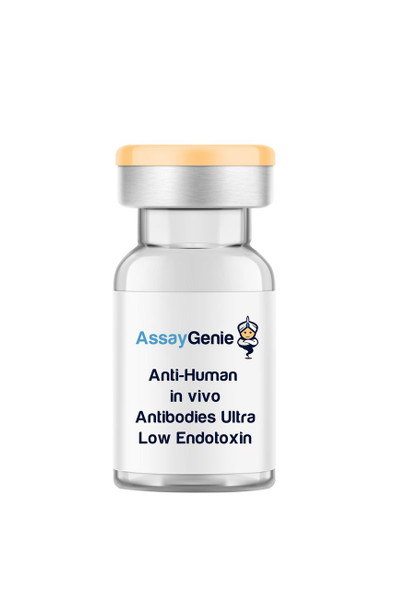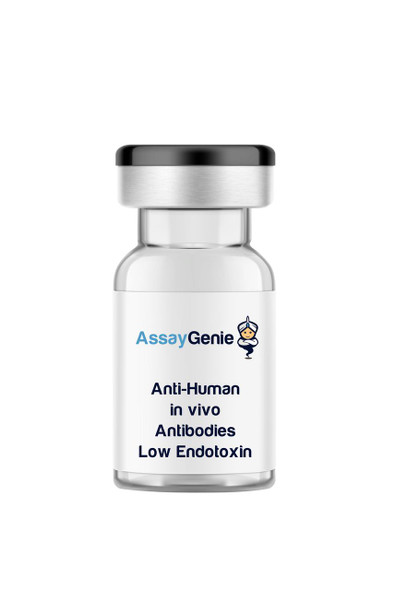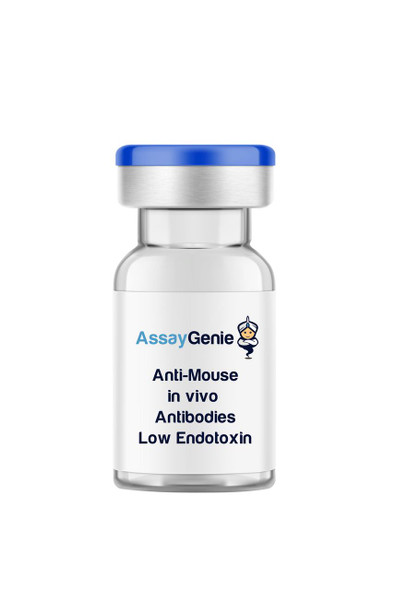Anti-Mouse ICAM-1 (CD54) [BE29G1] In Vivo Antibody - Low Endotoxin
- SKU:
- IVMB0168
- Product Type:
- In Vivo Monoclonal Antibody
- Clone:
- BE29G1
- Protein:
- Inter-Cellular Adhesion Molecule 1
- Isotype:
- Rat IgG2a
- Reactivity:
- Mouse
- Synonyms:
- BB2
- CD54
- P3.58
- Research Area:
- Adhesion & Migration
- Endotoxin Level:
- Low Endotoxin
- Host Species:
- Rat
- Applications:
- Blocking
- IP
- WB
Frequently bought together:
Description
system_update_altTechnical Datasheet
| Product Name: | Anti-Mouse ICAM-1 (CD54) [BE29G1] In Vivo Antibody - Low Endotoxin |
| Product Code: | IVMB0168 |
| Size: | 1mg, 5mg, 25mg, 50mg, 100mg |
| Clone: | BE29G1 |
| Protein: | Inter-Cellular Adhesion Molecule 1 |
| Product Type: | Monoclonal Antibody |
| Synonyms: | BB2, CD54, P3.58 |
| Isotype: | Rat IgG2a |
| Reactivity: | Mouse |
| Immunogen: | Purified Recombinant Mouse ICAM-1 (>98%) |
| Applications: | B, IP, WB |
| Formulation: | This monoclonal antibody is aseptically packaged and formulated in 0.01 M phosphate buffered saline (150 mM NaCl) PBS pH 7.2 - 7.4 with no carrier protein, potassium, calcium or preservatives added. |
| Endotoxin Level: | < 1.0 EU/mg as determined by the LAL method |
| Purity: | ≥95% monomer by analytical SEC >95% by SDS Page |
| Preparation: | Functional grade preclinical antibodies are manufactured in an animal free facility using only In vitro protein free cell culture techniques and are purified by a multi-step process including the use of protein A or G to assure extremely low levels of endotoxins, leachable protein A or aggregates. |
| Storage and Handling: | Functional grade preclinical antibodies may be stored sterile as received at 2-8°C for up to one month. For longer term storage, aseptically aliquot in working volumes without diluting and store at -80°C. Avoid Repeated Freeze Thaw Cycles. |
| Applications: | B, IP, WB |
| Reactivity: | Mouse |
| Host Species: | Rat |
| Specificity: | Rat Anti-Mouse CD54 (Clone BE29G1) recognizes the (Mr 95 kD) cell surface glycoprotein known as intracellular adhesion molecule ICAM-1. ICAM-1 is the receptor for LFA-1 (CD11a/CD18) and Mac-1 (CD11b/CD18).1,2,3 |
| Antigen Distribution: | The CD54 antigen is present on endothelial cells, lymphocytes, epithelial cells, dendritic cells and keratinocytes. It has been demonstrated that ICAM-1 enhances T-cell activation. |
| Immunogen: | Purified Recombinant Mouse ICAM-1 (>98%) |
| Concentration: | ≥ 5.0 mg/ml |
| Endotoxin Level: | < 1.0 EU/mg as determined by the LAL method |
| Purity: | ≥95% monomer by analytical SEC >95% by SDS Page |
| Formulation: | This monoclonal antibody is aseptically packaged and formulated in 0.01 M phosphate buffered saline (150 mM NaCl) PBS pH 7.2 - 7.4 with no carrier protein, potassium, calcium or preservatives added. |
| Preparation: | Functional grade preclinical antibodies are manufactured in an animal free facility using only In vitro protein free cell culture techniques and are purified by a multi-step process including the use of protein A or G to assure extremely low levels of endotoxins, leachable protein A or aggregates. |
| Storage and Handling: | Functional grade preclinical antibodies may be stored sterile as received at 2-8°C for up to one month. For longer term storage, aseptically aliquot in working volumes without diluting and store at -80°C. Avoid Repeated Freeze Thaw Cycles. |
Intercellular adhesion molecule-1 (ICAM-1) is one of an important cell adhesion molecules (CAMs) family transmembrane glycoprotein1 and is critical for the firm arrest and transmigration of leukocytes out of blood vessels and into tissues. ICAM-1 is constitutively present on endothelial cells, but its expression is increased by proinflammatory cytokines.2 ICAM-1 is a marker of endothelial dysfunction leading to damaging vascular disorders, in umbilical and placental vascular tissue of gestational pregnancies.3
| Technical Datasheet: | View |
| Protein: | Inter-Cellular Adhesion Molecule 1 |
| Ligand/Receptor: | CD11a/CD18 (LFA-1) or CD11b/CD18 (Mac-1) and CD11c/CD18, CD43, hyaluronan, fibrinogen |
| Research Area: | Cell Adhesion, Cell Biology, Costimulatory Molecules, Immunology, Innate Immunity, Neuroscience, Neuroscience Cell Markers, Stem Cell |

![Anti-Mouse ICAM-1 (CD54) [BE29G1] In Vivo Antibody - Low Endotoxin Anti-Mouse ICAM-1 (CD54) [BE29G1] In Vivo Antibody - Low Endotoxin](https://cdn11.bigcommerce.com/s-39x6lpnvxv/images/stencil/608x608/products/119916/118099/anti-mouse-icam-1-cd54-be29g1-in-vivo-antibody-low-endotoxin__35728__35216.1698937774.jpg?c=1)

![Anti-Mouse ICAM-1 (CD54) [BE29G1] In Vivo Antibody - Ultra Low Endotoxin Anti-Mouse ICAM-1 (CD54) [BE29G1] In Vivo Antibody - Ultra Low Endotoxin](https://cdn11.bigcommerce.com/s-39x6lpnvxv/images/stencil/590x590/products/119915/118098/anti-mouse-icam-1-cd54-be29g1-in-vivo-antibody-ultra-low-endotoxin__83512__71318.1698937773.jpg?c=1)
![Anti-Mouse CD54 [YN1/1.7.4] In Vivo Antibody - Low Endotoxin Anti-Mouse CD54 [YN1/1.7.4] In Vivo Antibody - Low Endotoxin](https://cdn11.bigcommerce.com/s-39x6lpnvxv/images/stencil/590x590/products/119810/117993/anti-mouse-cd54-yn11.7.4-in-vivo-antibody-low-endotoxin__21298__83121.1698937723.jpg?c=1)

![Anti-Mouse CD54 [YN1/1.7.4] In Vivo Antibody - Ultra Low Endotoxin Anti-Mouse CD54 [YN1/1.7.4] In Vivo Antibody - Ultra Low Endotoxin](https://cdn11.bigcommerce.com/s-39x6lpnvxv/images/stencil/590x590/products/119811/117994/anti-mouse-cd54-yn11.7.4-in-vivo-antibody-ultra-low-endotoxin__38336__06124.1698937723.jpg?c=1)




